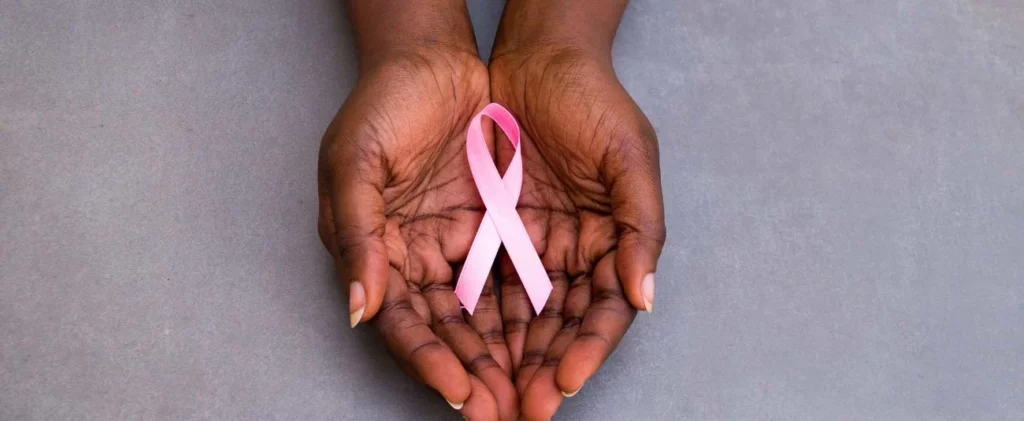Every October, the world unites in a vibrant global campaign aimed at eradicating breast cancer. Known as “Pink October”, this campaign is dedicated to raising awareness about breast cancer, promoting early detection, and supporting research for better treatment options. For the African Development Bank (the Bank), the month serves as a crucial reminder of the ongoing health challenges faced by people, particularly women, across the continent. Gender perspectives reveal that women encounter unique obstacles, be they social, cultural, economic, policy related. This makes Pink October an even more pressing call for action to improve health outcomes and the quality of life of the people of Africa.
The Rising Challenge of Breast Cancer in Africa
Breast cancer is now the most common form of cancer among women globally, causing over 670,000 deaths in 2022[i]. In sub-Saharan Africa, an alarmingly, 60 percent to 70 percent of women are diagnosed with advanced stage disease presented at Stage 3 and 4. Accessible infrastructure, quality training, preventive care, and supportive policies are essential for timely and adequate treatment, which significantly impacts survival rates. Currently, only 50 percent of women in Sub-Saharan Africa survive five years post-diagnosis compared to over 90 percent in high-income countries with affordable health care[ii].
The Bank’s Response: Strategic Initiatives
The Bank is making meaningful strides in addressing critical health challenges and empowering communities, particularly women in regional member countries. A few examples include the:
Uganda Oncology Project (East Africa Centre of Excellence Project): Approved in December 2023, this project aims to enhance cancer management in Uganda and the East African Community region by addressing critical shortages in oncology professionals. The project focuses on improving infrastructure and education at the Uganda Cancer Institute. Additionally, the project seeks to support regional integration in higher education, ensuring that training and services meet the growing demand for specialized oncology care to address the pressing shortage of skilled oncology professionals in Uganda and the East African Community. Key outputs include:
Building research and training capacity in cancer diagnosis and treatment.
Providing advanced cancer treatment facilities notably breast cancer.
Offering scholarships for 60 postgraduate candidates in oncology, with at least 30 percent reserved for women to help reduce the traditionally male-dominated Oncology field.
Increase 40 percent of early-stage breast cancer diagnoses and other forms of cancers by 2026.
Partnership with HealthTech Hub Africa, to develop a pan-African blueprint aimed at accelerating health tech innovations across the continent. This collaboration addresses the urgent demand for solutions to close health infrastructure gaps and extend affordable services to underserved communities by promoting advanced technologies like telemedicine and AI-powered diagnostics. HealthTech Hub Africa has supported 68 organizations in 17 countries, impacting over 2.35 million beneficiaries and creating more than 830 jobs. The agreement was announced at the HealthTech Africa Investor Summit on October 16, 2023.
“By creating a pan-African blueprint for health tech innovations, we aim to address critical infrastructure needs and extend affordable services to underserved communities. This collaboration will empower innovators and enhance healthcare delivery for millions, ultimately improving outcomes for women and men affected by breast cancer,”
states Martha T.M. Phiri, Director of Human Capital, Youth and Skills Development.
Institutional Initiatives At an institutional level, the Bank launches several initiatives every year to raise awareness about breast cancer and support the staff. This year for instance, an inaugural conference will be held on October 25, featuring expert discussions on breast cancer awareness and prevention. Additionally, screenings will be provided on October 29-31, ensuring access to essential health services. Regional Directorate Generals (RDGs) will spearhead communication efforts in their areas, promoting the importance of prevention and screening. Furthermore, the Bank’s medical plan will cover 100 percent of periodic medical check-ups, including mammograms and breast ultrasounds conducted. To enhance support, the Bank will also assist with treatments, medical follow-ups, and psychological support for employees affected by breast cancer.
“Breast cancer awareness is not just a campaign; it’s a commitment to the health and well-being of our employees and their families. By promoting early detection and providing essential support, we aim to create a culture where health takes priority, and everyone feels empowered to take charge of their wellness.”
Ali Ramzi Mohammed, Director staff welfare services, compensation and employment policy.
A Collective Commitment
As we observe Pink October, let us reaffirm our commitment to fighting breast cancer in Africa. The African Development Bank prioritizes internal efforts, fostering a supportive environment for its employees through awareness campaigns and health initiatives. By investing in health systems, supporting research, and advocating for universal access to care, we can reduce the burden of breast cancer and empower women everywhere.
As we highlight these initiatives, it is important to remember the real impact of our efforts through the voices of those directly affected. A colleague and cancer survivor shared her experience, emphasizing the critical role of awareness and support in the journey through breast cancer:
“Surviving breast cancer has shown me the power of community and the importance of early detection. I am grateful for the support around me including the Bank and hope my journey inspires others to prioritize their health and seek the care they deserve.”
Zeneb Touré, Manager of the Civil Society Engagement Division.
Let’s wear pink not just this October, but every day, as a symbol of hope, solidarity, and our shared commitment to fight breast cancer. Together, we can create a healthier future for women and men across Africa.
African Development Bank Group







OTHER ARTICLES
Editorial — Prevent, inform, and act for women’s health in Africa
Kenya : Government Prioritises Maternal Health and Strengthens Support for Community Health Promoters
Strengthening pandemic prevention, preparedness, and response capacities in Senegal using the “One Health” approach